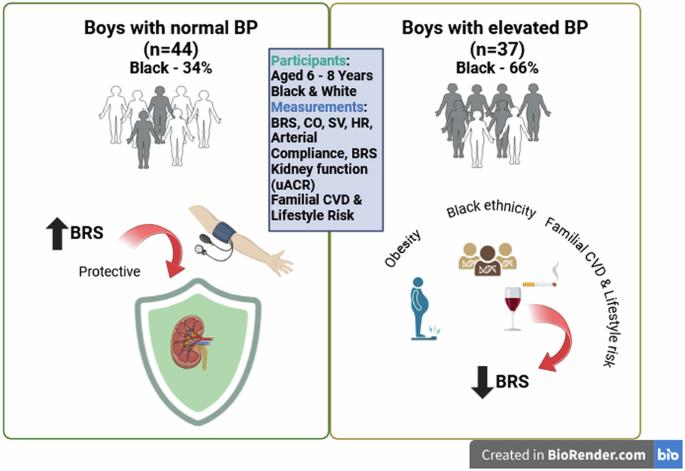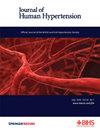血压正常与血压升高的青春期前男孩的压力感受器敏感性、肾功能和心血管风险
IF 3.4
4区 医学
Q2 PERIPHERAL VASCULAR DISEASE
引用次数: 0
摘要
在儿童中,压力感受器敏感性(BRS)降低与肥胖有关,但与血压(BP)无关。高血压父母的后代BRS降低,可能增加高血压发展和肾功能障碍的风险。本研究旨在探讨不同血压水平的青春期前男孩BRS、肾功能、家族性心血管和生活方式风险之间的关系。我们包括40名黑人和41名白人男孩(6-8岁)。人体测量包括计算的身体质量指数(BMI)和特定性别和年龄的BMIz分数(BMIz)。人口统计数据通过问卷收集,包括家族心血管疾病和生活方式风险信息。心血管测量为静息血压和Finometer监测BRS计算。采用尿白蛋白与肌酐比值(uACR)评估肾功能。分层是基于正常或升高的血压状态。血压升高组黑人男孩较多(n = 37;65.5%;p = 0.003)。值得注意的是,BRS (p = 0.56)和uACR (p = 0.92)在血压正常组和升高组之间具有可比性。在正常血压组,单一、部分和完全调整模型显示BRS与uACR呈负相关(β = -0.38;p = 0.009)。在血压升高组,BRS与家族性风险相关(β = -0.52;p = 0.002), BMIz (β = 0.36;p = 0.020)和黑人(β = -0.37;p = 0.024),但BRS与uACR之间无明显关联。血压正常的男孩BRS与肾功能之间存在心脏保护关系。在血压升高的男孩中,家族性心血管和生活方式风险呈阳性,肥胖和黑人种族似乎通过与较低BRS的关系增加心血管疾病风险。本文章由计算机程序翻译,如有差异,请以英文原文为准。

Baroreceptor sensitivity, kidney function and cardiovascular risk in prepubescent boys with normal versus elevated blood pressure
In children reduced baroreceptor sensitivity (BRS) has been linked to obesity but not blood pressure (BP). Offspring of hypertensive parents have reduced BRS, with possibly increasing risk for hypertension development and kidney dysfunction. This study aimed to explore the relationships between BRS, kidney function, familial cardiovascular-and lifestyle risk in prepubescent boys with varying BP levels. We included 40 Black and 41 White boys (aged 6–8 years). Anthropometric measurements included calculated body mass index (BMI) and sex-and-age specific BMI z-scores (BMIz). Demographic data was collected with questionnaires and included information on familial cardiovascular-and lifestyle risk. Cardiovascular measures were resting BP and Finometer monitoring for BRS calculation. Kidney function was assessed using urinary albumin-to-creatinine ratio (uACR). Stratification was based on normal or elevated BP status. The elevated BP group had more Black boys (n = 37; 65.5%; p = 0.003). Notably, BRS (p = 0.56) and uACR (p = 0.92) were comparable between normal and elevated BP groups. In the normal BP group, single, partial and fully adjusted models revealed an inverse association between BRS and uACR (β = −0.38; p = 0.009). In the elevated BP group, BRS associated with familial risk (β = −0.52; p = 0.002), BMIz (β = 0.36; p = 0.020) and Black ethnicity (β = −0.37; p = 0.024), yet no association was evident between BRS and uACR. A cardioprotective relationship exists between BRS and kidney function in boys with normal BP. In boys with elevated BP, a positive familial cardiovascular-and lifestyle risk, adiposity and Black ethnicity seems to contribute to cardiovascular disease risk via a relationship with lower BRS.
求助全文
通过发布文献求助,成功后即可免费获取论文全文。
去求助
来源期刊

Journal of Human Hypertension
医学-外周血管病
CiteScore
5.20
自引率
3.70%
发文量
126
审稿时长
6-12 weeks
期刊介绍:
Journal of Human Hypertension is published monthly and is of interest to health care professionals who deal with hypertension (specialists, internists, primary care physicians) and public health workers. We believe that our patients benefit from robust scientific data that are based on well conducted clinical trials. We also believe that basic sciences are the foundations on which we build our knowledge of clinical conditions and their management. Towards this end, although we are primarily a clinical based journal, we also welcome suitable basic sciences studies that promote our understanding of human hypertension.
The journal aims to perform the dual role of increasing knowledge in the field of high blood pressure as well as improving the standard of care of patients. The editors will consider for publication all suitable papers dealing directly or indirectly with clinical aspects of hypertension, including but not limited to epidemiology, pathophysiology, therapeutics and basic sciences involving human subjects or tissues. We also consider papers from all specialties such as ophthalmology, cardiology, nephrology, obstetrics and stroke medicine that deal with the various aspects of hypertension and its complications.
 求助内容:
求助内容: 应助结果提醒方式:
应助结果提醒方式:


